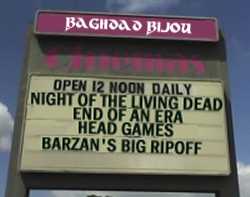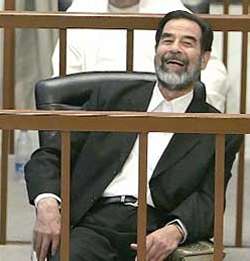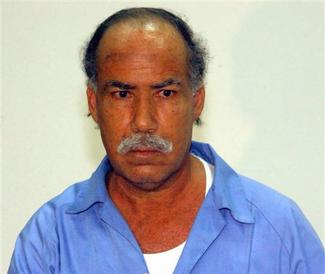 The spokesman for the Iraqi government Dr. Ali al-Dabbagh showed journalists on Monday a video tape recording the execution of Saddam's two aides during which one of them was beheaded. The film shows Barzan al-Tikriti, Saddam's half brother, and Awwad al-Bander, former revolutionary court chief judge, in prisoners orange uniforms as they were standing on gallows in preparation for hanging side by side. Hangmen placed black hoods round the two men's heads, then the noose for carrying out the execution. The video tape also showed Barzan al-Tikriti lying headless below the gallows, his severed head several yards away.
The spokesman for the Iraqi government Dr. Ali al-Dabbagh showed journalists on Monday a video tape recording the execution of Saddam's two aides during which one of them was beheaded. The film shows Barzan al-Tikriti, Saddam's half brother, and Awwad al-Bander, former revolutionary court chief judge, in prisoners orange uniforms as they were standing on gallows in preparation for hanging side by side. Hangmen placed black hoods round the two men's heads, then the noose for carrying out the execution. The video tape also showed Barzan al-Tikriti lying headless below the gallows, his severed head several yards away."Yo, Mahmoud! Roll that thing over here, wouldja?"
The Iraqi former President Saddam Hussein's half-brother Barzan al-Tikriti and former revolutionary court chief judge Awwad al-Bandar were hanged at dawn Monday in Baghdad. Saddam Hussein and his two aides were convicted of involvement in the killing of 148 civilians in the village of Dujail after a failed attempt to kill the former president.
| Any chance we can show that film on Saturday night at Gitmo? |
Saddam's half-brother Tikriti and former revolutionary court chief judge Bandar were hanged on Monday in Baghdad, 16 days after the execution of Saddam. The three were convicted of involvement in the killing of 148 civilians in the village of Dujail after a failed attempt to kill the former president. "It is a joy to get rid of every tyrant who killed Iraqis. This is the fate of every murderer and we have to understand the new Iraq can not be established with the presence of criminals and tyrants," Jamal al-Taai, a civil servant, said.
Saleem al-Asadi, another civil servant, said the joy of the execution of the two aides came a little late. "The government should have executed Barzan and Bandar together with Saddam so that the joy is much bigger and we can say that we got rid of the criminals," he said. Revealing his personal vendetta against Bandar, Asadi said: "Bandar sentenced my brother to death, leaving mother to grieve over him until she died."
Media worker Jihad al-Asadi said Monday's executions turned over a dark page in the history of Iraq. But Mohannad Hussein exclaimed, "What benefit will I get from the hanging of Barzan and Awwad?"
"I no longer think of those people... I have to get through my day in conditions harsher than what some might think," he said. "I will be really happy when I find electricity, water and fuel available and prices affordable. Only then I will say that execution is useful," Hussein said.
For Hussein al-Hasnawi, a former political prisoner, Iraqi people would not rest even if all the lackeys of the former regime were hanged. "The mistakes of today's politicians are far graver than the executions and the joy they bring," he explained.


 LAWYERS for Saddam Hussein and two former aides sentenced to death lodged appeals today, the Iraqi prosecutor said, following a trial slammed by some rights experts as unfair and fundamentally flawed.
LAWYERS for Saddam Hussein and two former aides sentenced to death lodged appeals today, the Iraqi prosecutor said, following a trial slammed by some rights experts as unfair and fundamentally flawed. IRAQ'S ousted president Saddam Hussein was admitted to hospital suffering from the effects of his hunger-strike, chief prosecutor Jaafar al-Musawi said.
IRAQ'S ousted president Saddam Hussein was admitted to hospital suffering from the effects of his hunger-strike, chief prosecutor Jaafar al-Musawi said. The chief judge overseeing the trial of ousted Iraqi leader Saddam Hussein has opened what he says will be the final day for defence witnesses to be heard. Judge Rauf Abdel Rahman urged the defence team to concentrate on witness testimony, not on "endless rhetoric". One of Saddam's seven co-defendants, his half-brother
The chief judge overseeing the trial of ousted Iraqi leader Saddam Hussein has opened what he says will be the final day for defence witnesses to be heard. Judge Rauf Abdel Rahman urged the defence team to concentrate on witness testimony, not on "endless rhetoric". One of Saddam's seven co-defendants, his half-brother  Iraqi guards at Saddam Hussein's trial manhandled a defense lawyer from the court on Monday before witnesses, including one of the former president's half-brothers, gave testimony for some of his co-defendants. Lebanese attorney Bushra Khalil, a vocal presence in previous televised appearances for the defense, yelled in protest and threw off her black court robe. "Are you a lawyer or a gang boss?" Judge Raouf Abdul Rahman barked at Khalil, who slapped the hand of a guard as he dragged her out of the chamber.
Iraqi guards at Saddam Hussein's trial manhandled a defense lawyer from the court on Monday before witnesses, including one of the former president's half-brothers, gave testimony for some of his co-defendants. Lebanese attorney Bushra Khalil, a vocal presence in previous televised appearances for the defense, yelled in protest and threw off her black court robe. "Are you a lawyer or a gang boss?" Judge Raouf Abdul Rahman barked at Khalil, who slapped the hand of a guard as he dragged her out of the chamber.  Saddam Hussein's half brother,
Saddam Hussein's half brother,